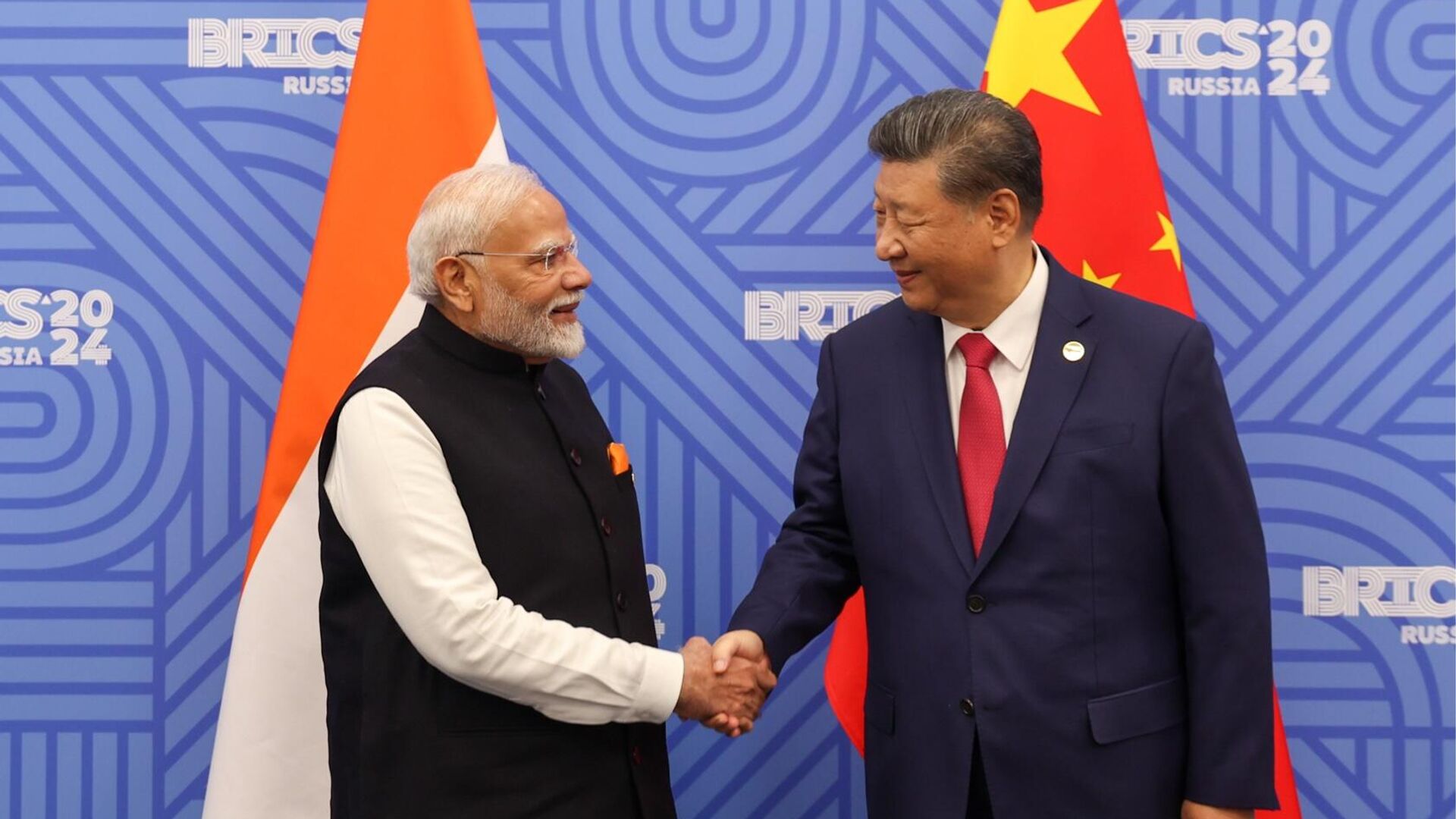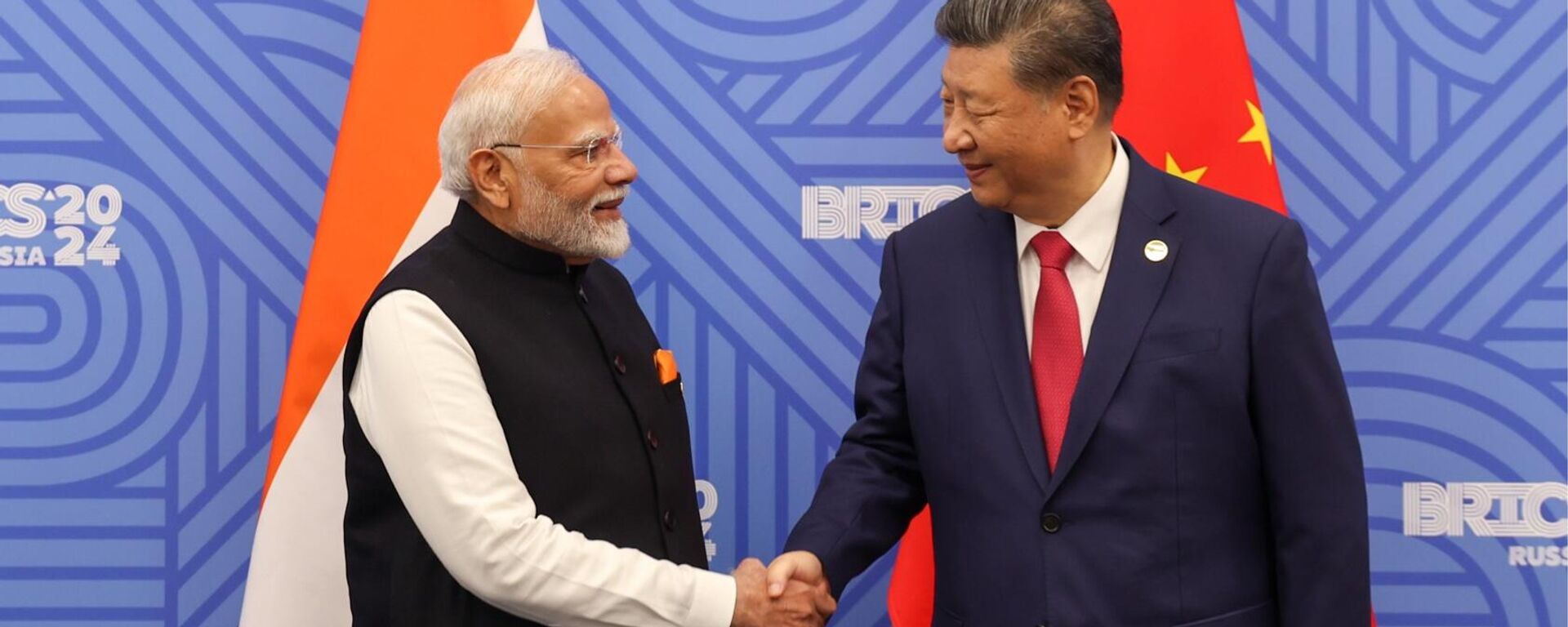https://sputniknews.in/20241029/cold-war-out-the-door-sino-indian-dtente-bound-to-be-geopolitical-game-changer-8336211.html
Cold War Out the Door: Sino-Indian Détente Bound to Be Geopolitical Game Changer
Cold War Out the Door: Sino-Indian Détente Bound to Be Geopolitical Game Changer
Sputnik India
India-China rapprochement could significantly reshape Asia’s geopolitical landscape. By reducing tensions between the two major powers, it would foster... 29.10.2024, Sputnik India
2024-10-29T16:05+0530
2024-10-29T16:05+0530
2024-10-29T18:09+0530
brics summit 2024
brics
kazan brics summit
multipolar world
china
india
narendra modi
xi jinping
ladakh
https://cdn1.img.sputniknews.in/img/07e8/0a/17/8318081_0:761:1685:1709_1920x0_80_0_0_39804d404f611f12f45c9c66efe04e7c.jpg
The idea that a Cold War 2.0 is brewing is only partly correct. In today's scenario, where the Global South has come together much more strongly, the alternative of a multipolar New World Order is eagerly sought after by most countries. It is now apparent that a Cold War 2.0 will have very little impact or traction, Indian Air Force (IAF) veteran, and Founder of The Peninsula Foundation said.M. Matheswaran further noted that China is already India's largest trading partner. As both countries are civilization states, rapprochement between India and China would not only open the door for multi-dimensional cooperation gradually but, more importantly, would benefit countries in Asia. It would certainly strengthen BRICS and enhance its profile in global governance. This historic détente could also weaken US influence in the region by reducing the need for alliances aimed at containing China, and more importantly, if China and India resolve their issues, the fundamental rationale behind the Quad alliance could be weakened, Neeraj Singh Manhas, a special Advisor for South Asia at Parley Policy Intiative, Republic of Korea, told Sputnik India. Given that the Quad is often seen as a counter to China’s rise, it would need to redefine its objectives. This shift may necessitate a move away from the primary focus on security towards broader regional cooperation. However, Manhas cautioned that the group may encounter challenges in maintaining its relevance amidst these changes. Dr. Pravesh Kumar Gupta, an Associate Fellow at the Vivekananda International Foundation (Eurasia), stated in a conversation with Sputnik India that the recent rapprochement between India and China will take time to produce tangible results, which will largely depend on China's actions. To foster mutual trust, he stressed that Beijing must demonstrate a strong commitment and act accordingly.The normalisation of India-China relations is drawing significant scrutiny from the West, particularly as the PRC poses a primary challenge to the US-led West. Historically, tensions between India and China have served Western interests, he maintained. India's partnership in the Quad highlights its commitment to maintaining a free and open Indo-Pacific. Importantly, India's participation in the grouping is not aimed at any third country; rather, it aligns primarily with its own geostrategic objectives, he noted.Meanwhile, India should approach the normalisation of relations with China cautiously. Incremental steps toward engagement must be balanced with strategic investments that bolster India's resilience and influence in the region. However, in an era defined by shifting alliances and the emergence of multipolarity, India has deliberately chosen to avoid entanglements, pundits concluded.
https://sputniknews.in/20241023/india-china-rapprochement-bad-news-for-wests-military-industrial-complex-8317587.html
china
india
ladakh
Sputnik India
feedback.hindi@sputniknews.com
+74956456601
MIA „Rossiya Segodnya“
2024
Muhammad Sharif
https://cdn1.img.sputniknews.in/img/07e7/0b/05/5257054_0:0:443:444_100x100_80_0_0_b8bd2af32be62a6eecdb4a84c7fd978f.jpg
Muhammad Sharif
https://cdn1.img.sputniknews.in/img/07e7/0b/05/5257054_0:0:443:444_100x100_80_0_0_b8bd2af32be62a6eecdb4a84c7fd978f.jpg
News
en_IN
Sputnik India
feedback.hindi@sputniknews.com
+74956456601
MIA „Rossiya Segodnya“
Sputnik India
feedback.hindi@sputniknews.com
+74956456601
MIA „Rossiya Segodnya“
Muhammad Sharif
https://cdn1.img.sputniknews.in/img/07e7/0b/05/5257054_0:0:443:444_100x100_80_0_0_b8bd2af32be62a6eecdb4a84c7fd978f.jpg
chine, india, cold war, quad
chine, india, cold war, quad
Cold War Out the Door: Sino-Indian Détente Bound to Be Geopolitical Game Changer
16:05 29.10.2024 (Updated: 18:09 29.10.2024) India-China rapprochement could significantly reshape Asia’s geopolitical landscape. By reducing tensions between the two major powers, it would foster regional stability and avoid a "Cold War" scenario in the Asia Pacific.
The idea that a Cold War 2.0 is brewing is only partly correct. In today's scenario, where the Global South has come together much more strongly, the alternative of a multipolar New World Order is eagerly sought after by most countries. It is now apparent that a Cold War 2.0 will have very little impact or traction, Indian Air Force (IAF) veteran, and Founder of The Peninsula Foundation said.
"This is particularly significant in the context of the evolving geopolitical dynamics in Asia and the world. Hence, the recent announcement of the Sino-Indian detente is welcomed by all, particularly in both countries, in light of the rapidly evolving dimension of BRICS as an alternative to Western dominance in the global system,"Air Marshal (Retd) M. Matheswaran told Sputnik India.
M. Matheswaran further noted that China is already India's largest trading partner. As both countries are civilization states, rapprochement between India and China would not only open the door for multi-dimensional cooperation gradually but, more importantly, would benefit countries in Asia. It would certainly strengthen BRICS and enhance its profile in global governance.
This historic détente could also weaken
US influence in the region by reducing the need for alliances aimed at containing China, and more importantly, if
China and India resolve their issues, the fundamental rationale behind the
Quad alliance could be weakened,
Neeraj Singh Manhas, a special Advisor for South Asia at Parley Policy Intiative, Republic of Korea, told
Sputnik India.
Given that the Quad is often seen as a counter to China’s rise, it would need to redefine its objectives. This shift may necessitate a move away from the primary focus on security towards broader regional cooperation. However, Manhas cautioned that the group may encounter challenges in maintaining its relevance amidst these changes.
"A hypothetical India-China rapprochement would alter the power dynamics in the region, easing military stand-offs and shifting the focus to economic and trade cooperation. BRICS could play a vital role in this scenario, fostering multilateral dialogue and economic collaboration, reducing dependency on Western-led institutions, and promoting a more balanced global order," Mr. Neeraj Singh Manhas said.
Dr. Pravesh Kumar Gupta, an Associate Fellow at the Vivekananda International Foundation (Eurasia), stated in a conversation with Sputnik India that the recent rapprochement between India and China will take time to produce tangible results, which will largely depend on China's actions. To foster mutual trust, he stressed that Beijing must demonstrate a strong commitment and act accordingly.
The normalisation of
India-China relations is drawing significant scrutiny from the West, particularly as the PRC poses a primary challenge to
the US-led West. Historically, tensions between India and China have served Western interests, he maintained.
"Recently, the US has attempted to exert pressure on India, but New Delhi has managed these challenges while staying true to its foreign policy objectives. The recent thaw in India-China relations could complicate the US's strategy, creating potential challenges for its efforts to counter China's influence in the region," Mr. Gupta noted.
India's partnership in the Quad highlights its commitment to maintaining a free and open Indo-Pacific. Importantly, India's participation in the grouping is not aimed at any third country; rather, it aligns primarily with its own geostrategic objectives, he noted.
"As a rising global power, India’s foreign policy is anchored in two key objectives: maintaining strategic autonomy and safeguarding national interests. These goals provide a framework through which India navigates the complexities of international relations, allowing it to assert its position on the global stage while ensuring its sovereignty," expert emphasized.
Meanwhile, India should approach the
normalisation of relations with China cautiously. Incremental steps toward engagement must be balanced with strategic investments that bolster India's resilience and influence in the region. However, in an era defined by shifting alliances and the emergence of
multipolarity, India has deliberately chosen to avoid entanglements, pundits concluded.



